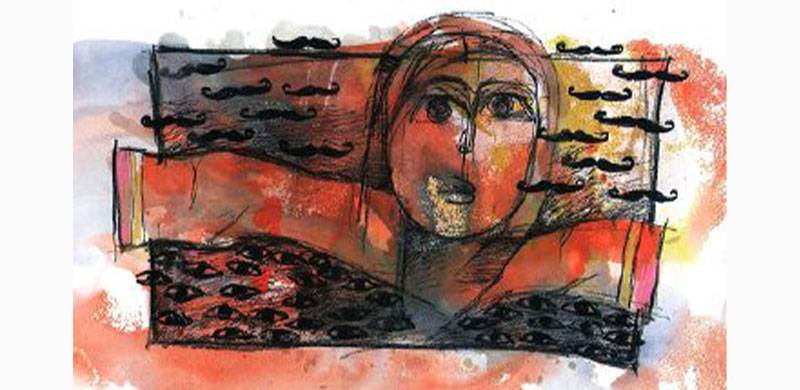
“Every time we [women] pay the price for crimes committed by our brothers or fathers. They do commit crimes and we face the brunt -- in form of swara,” says Sana Gul, a resident of Hoti area in District Mardan district.
Sana Gul’s brother allegedly killed their neighbour for trespassing into their fields. The jirga decided to exchange her in swara to settle the dispute between the two families.
“I pray to god that no woman is given away in swara,” she adds.
Rubab Mehdi, Regional Chief Commissioner of Mukhtasib Peshawar, says that although her department has not received any swara cases, she has settled a couple of cases in her personal capacity. “Swara is the worst form of harassment. Every time an innocent girl becomes the victim of cruelties committed by the male members of her family. She suffers for the rest of her life. Often she becomes a mental health patient,” she adds.
Journalist and researcher, Jibran Mehboob Buneri, says the history of swara is at least 500 years old -- “It was used to bring peace in the Pashtun area”. Mughal emperor Akbar tried to abolish sawara and the Hindu ritual of sati. Back then, one-third of crop was given away to the victim’s family if the crime was petty, and a male member of the victim’s family would have to marry a female from the culprit’s family if the crime was serious -- “Woman was considered a symbol of family honour. Swara was meant to honour the victim’s family for the offence committed by the male members of her family.”
Peshawar High Court advocate and human rights activist, Nastasha Khan, says that the Criminal Law (Amendment) Act was introduced in 2004 to end this practice. Amendments were made in the Code of Criminal Procedure and the Pakistan Penal Code -- “The law makes it a punishable offense to marry a woman or a girl for the sake of peace. Those convicted of the crime and their accomplices were sentenced for three to seven years in prison. In addition to the penalty, they can be fined for up to Rs5 lac.”
She adds that it is the duty of lawyers to create awareness about the crime and related punishment -- “It is an ugly ritual”.
According to Peshawar-based journalist, Sohail Ahmed Danish, between 2002 to 2006 in Khyber Pakhtunkhwa districts of Mardan and Swabi, about 66 minors girls were given away in swara -- “But after the Prevention of Anti-Women Practices Act, 2011, the number of swara cases came down.” The Federal Shariat Court considers this ritual as illegal.
Pakistan has a framework of laws and policies to prevent swara in place, yet the crime perpetuates. The local authorities in KP must be educated about the barbarity involved in this custom of trading women for peace. We can no longer allow a killer to become a hero in our society.
Sana Gul’s brother allegedly killed their neighbour for trespassing into their fields. The jirga decided to exchange her in swara to settle the dispute between the two families.
“I pray to god that no woman is given away in swara,” she adds.
Rubab Mehdi, Regional Chief Commissioner of Mukhtasib Peshawar, says that although her department has not received any swara cases, she has settled a couple of cases in her personal capacity. “Swara is the worst form of harassment. Every time an innocent girl becomes the victim of cruelties committed by the male members of her family. She suffers for the rest of her life. Often she becomes a mental health patient,” she adds.
The history of swara is at least 500 years old -- “It was used to bring peace in the Pashtun area”.
Journalist and researcher, Jibran Mehboob Buneri, says the history of swara is at least 500 years old -- “It was used to bring peace in the Pashtun area”. Mughal emperor Akbar tried to abolish sawara and the Hindu ritual of sati. Back then, one-third of crop was given away to the victim’s family if the crime was petty, and a male member of the victim’s family would have to marry a female from the culprit’s family if the crime was serious -- “Woman was considered a symbol of family honour. Swara was meant to honour the victim’s family for the offence committed by the male members of her family.”
Peshawar High Court advocate and human rights activist, Nastasha Khan, says that the Criminal Law (Amendment) Act was introduced in 2004 to end this practice. Amendments were made in the Code of Criminal Procedure and the Pakistan Penal Code -- “The law makes it a punishable offense to marry a woman or a girl for the sake of peace. Those convicted of the crime and their accomplices were sentenced for three to seven years in prison. In addition to the penalty, they can be fined for up to Rs5 lac.”
“The law makes it a punishable offense to marry a woman or a girl for the sake of peace. Those convicted of the crime and their accomplices were sentenced for three to seven years in prison. In addition to the penalty, they can be fined for up to Rs5 lac.”
She adds that it is the duty of lawyers to create awareness about the crime and related punishment -- “It is an ugly ritual”.
According to Peshawar-based journalist, Sohail Ahmed Danish, between 2002 to 2006 in Khyber Pakhtunkhwa districts of Mardan and Swabi, about 66 minors girls were given away in swara -- “But after the Prevention of Anti-Women Practices Act, 2011, the number of swara cases came down.” The Federal Shariat Court considers this ritual as illegal.
Pakistan has a framework of laws and policies to prevent swara in place, yet the crime perpetuates. The local authorities in KP must be educated about the barbarity involved in this custom of trading women for peace. We can no longer allow a killer to become a hero in our society.

